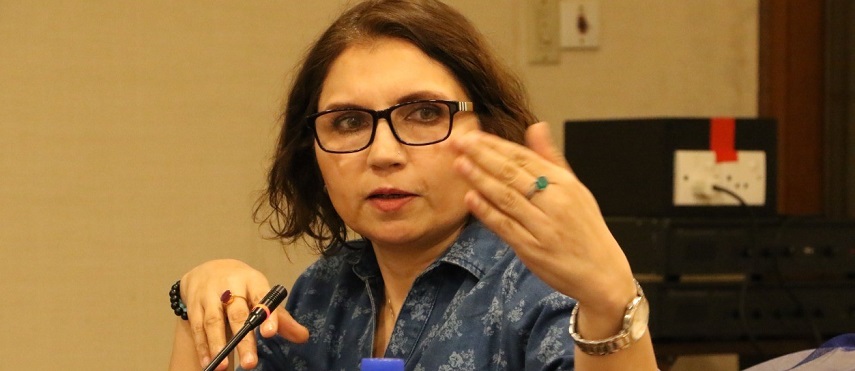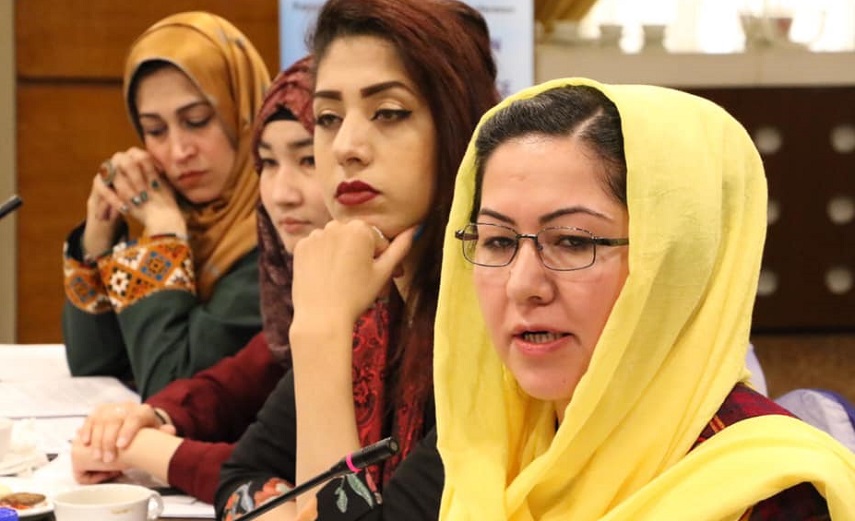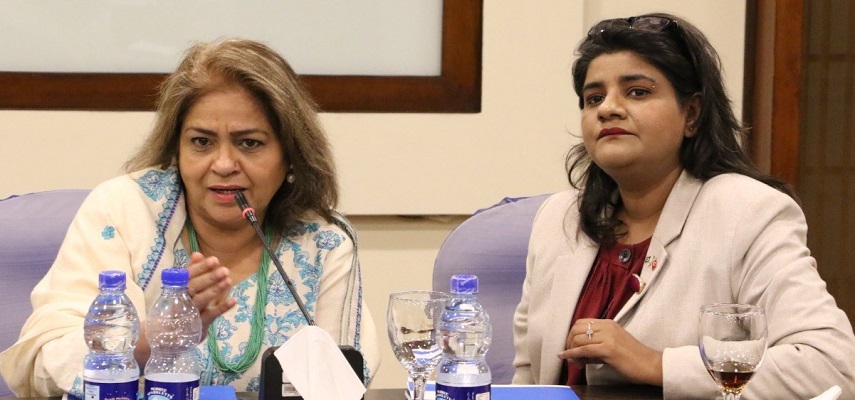On the sidelines of Afghan women leaders’ delegation’s visit to Islamabad, on February 17, 2020, the Afghan and Pakistani women delegations over working lunch also met with members of Islamabad Women Chamber of Commerce and Industry (IWCCI), Federation of Pakistan Chambers of Commerce and Industry (FPCCI) Rawalpindi and Peshawar Chamber women representatives, including Ms. Samina Fazil; Founder and President of IWCCI, Ms. Salma Gul; CEO of Safe Solution Consultant, Ms. Ambreen Zaman; President of Rawalpindi Women Chamber of Commerce and Industry (RWCCI), Ms. Naima Ansari; Former Vice President of Federation of Pakistan Chambers of Commerce and Industries, Ms. Shamama Arbab; President of Peshawar Women Chamber of Commerce and Industries (PWCCI) and Ms. Ruby Gul Afridi; Founder of Woodpecker Communications.
Members of Afghan delegation, Pakistan delegates and the Pakistani women entrepreneurs discussed the challenges faced by women on both sides in setting up women-owned businesses, exchanges of ideas on increasing business cooperation and possible collaborations, as well as creating links between the women chambers of commerce and industries on both sides.
Pakistani businesswoman affiliated with RWCCI and CEO of Safe Solution Consultant, Ms. Shamama Arbab, warmly welcomed the Afghan women delegation and stated that, as a Pashtoon belonging to Khyber Pakhtunkha which is in closer proximity to Afghanistan, she believes her experience will be more relevant and beneficial for the Afghan women. She stressed though that the strength of a woman is in her knowledge. Ms. Shamama also shared that she was a member of the Sovereign South Asian Women Entrepreneurs Network where businesswomen from Pakistan, India, Sri Lanka, Nepal and Bangladesh are represented and they get together to share and exchange their best business practices. As a result, the women from all these countries become acquainted with how best to conduct their business. She proposed that Pakistan and Afghanistan have an edge as they have similar cultures. If they follow this model for women entrepreneurs on both sides, they can benefit greatly from each other’s best practices and expertise as well.
Speaking on the issues faced by women while entering into business, Afghan delegate, Ms. Freshta Zuhal Rahman, Professor and Attorney at Law, stated that, in Afghanistan, unlike men, women do not enjoy the right links and contacts to start and develop a business. The businesses that the women are active in Afghanistan are mainly in the fashion industry, she said. Furthermore, she stated that she was the only woman in Afghanistan who was a partner in a law firm.
Ms. Ruby Gul Afridi, a Pakistani entrepreneur, stated that when she started her business, there were very limited women doing business in Pakistan. However, they made their space with determination and continued struggle. She encouraged that in Afghanistan too, women can make their space if they remain determined and dedicated in their efforts. Though, she shared that women in Pakistan still continue to face many challenges, including those from banks which do not easily give loans to women for their business, or not enough to start one with.
Afghan delegate, Ms. Ghazalan Koofi, Founder of Afghan Movement of Social and Economic Development Organization, stated that there needs to be laws in Afghanistan that support women financially at the grass root level. Especially, women in the rural areas, that are deprived of education and other facilities, need to be given a special focus by the government as well as non-governmental organizations to enable them to set up and grow a business.
Ms. Samina Fazil, the Founder and President of IWCCI, stated that the IWCCI provides up to 5 lacs in loan to young women entrepreneurs that want to set up a business venture. She stated that most women are not aware of the norms of business in Pakistan as well, and hence are unable to avail bank loans. Hence, there is a need to educate them about it as well, she added.
Discussing the cultural issues that bar women from freely entering into this domain, the Afghan and Pakistani women agreed that there were certainly similar challenges being faced by women on both sides. Shedding light on the Pashtoon culture in the Khyber Pakhtunkhwa province, which is similar to the Afghan culture, for example, Ms. Shamama observed, that Pashtoon women cannot lead a business venture without the support of a male figure in their family, be it their brothers, fathers, husbands or sons. Hence, she affirmed that keeping in view the sensitivity of the Afghan culture, women may need to dedicate their efforts with persistence to operate independently and they will see fruitful results soon.
Ms. Ambreen Zaman, President of Rawalpindi Women Chamber of Commerce and Industry (RWCCI), stated that she started her business without the help and support of any male in her family and has been successfully running it for the last 20 years in Pakistan. As a member of RWCCI, she said that the real empowerment of the women would be if they could also become equal members as well as presidents in the General Chambers and not have to require separate women chambers. Hence, in order to be really empowered and equal to men, they should be included in the general business culture and community, she stated.
Afghan delegate, Ms. Freshta, shared that, in Afghanistan too, women require the financial support of the family to start a business. While a male will easily receive financial help from the family to start a business, the women will not. Hence, exploring the different avenues where women can avail business opportunities, Ms. Freshta stated that, luckily, there are micro-finance institutions in Afghanistan that provide financial support to women to start and run their businesses. However, as they are small loans for small businesses, they do not suffice if the women want to start a big venture.
Pakistani delegate, Ms. Samina Fazil, stated that, despite the presence of micro-finance institutions helping women set up businesses, the biggest challenge for developing women entrepreneurship is the lack of training of these women in order to become innovative to meet the international standards. She stated that as the world is advancing in technology and innovation, Pakistan, unfortunately, still lags behind. There is a need to train women entrepreneurs in digital skills so they can digitalize their businesses and acquire the required pace in global innovation.
Ms. Samina Fazil proposed that there should be an introductory course on digital literacy to all women entrepreneurs by the micro-financing institutions. This way, their products will reach a bigger market. She encouraged that the women, just like this forum, should join hands in cooperation so they can strengthen each other overall in the society.
Members of IWCCI, FPCCI and RWCCI extended their offer of linking up with the Afghan Women Chamber of Commerce and Industries and encouraged the Afghan women delegates present to reach out to them for any future collaborations and linkages.







